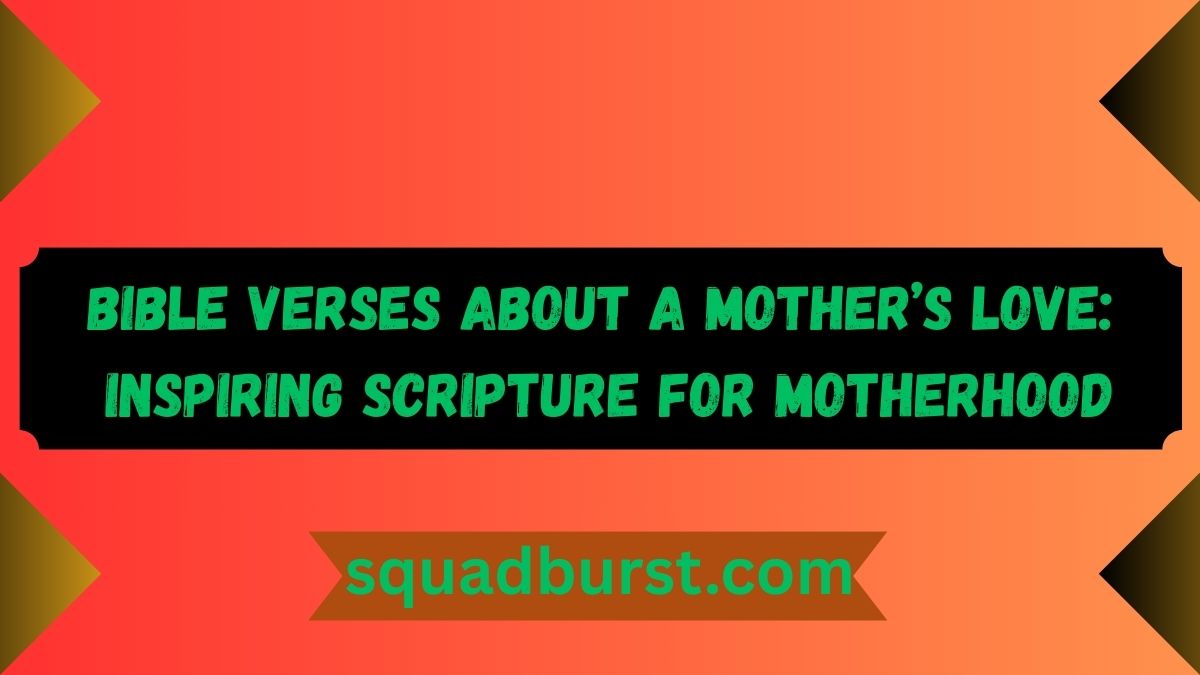Bible Verses About a Mother’s Love: Inspiring Scripture for Motherhood refers to powerful passages in the Bible that celebrate the beauty, strength, and devotion of mothers. These verses illustrate the unconditional love, selflessness, and faith that define motherhood, offering guidance and comfort to families.Bible Verses About a Mother’s Love: Inspiring Scripture for Motherhood Rooted in God’s Word, they highlight how a mother’s love reflects the divine compassion and nurturing nature of God Himself.
Bible Verses About a Mother’s Love: Inspiring Scripture for MotherhoodMotherhood isn’t just a role; it’s a sacred calling filled with grace, sacrifice, and strength. A mother’s touch brings comfort, her wisdom shapes lives, and her faith becomes a beacon for generations. Bible Verses About a Mother’s Love: Inspiring Scripture for Motherhood These scriptures don’t just speak of love—they paint vivid pictures of resilience and tenderness that resonate deeply with every heart.
Bible Verses About a Mother’s Love: Inspiring Scripture for MotherhoodWhen you read Bible verses about a mother’s love, you uncover timeless truths that honor mothers and their irreplaceable role in God’s plan. These inspiring scriptures not only uplift moms but also remind families to cherish, respect, and celebrate the women who give so much of themselves every day.
Understanding a Mother’s Love Through Scripture
Biblical parenting principles emerge from understanding how God views motherhood. The role of mothers in Christianity extends far beyond physical care—it encompasses spiritual nurturing, faithful teaching, and unwavering support.
Scripture reveals that maternal love in scripture mirrors God’s own heart. This connection isn’t coincidental. God deliberately uses motherhood as a lens through which we can grasp His infinite care for His children.
The Divine Nature of Maternal Love
Faith and motherhood share remarkable similarities in their transformative power. Both require:
- Unconditional commitment despite circumstances
- Sacrificial love that puts others first
- Patient endurance through difficult seasons
- Hopeful trust in unseen outcomes
- Gentle strength that never gives up
These qualities make mothers powerful conduits of God’s grace. Examples of mothers in the Bible consistently demonstrate these characteristics, from Hannah’s persistent prayers to Mary’s faithful obedience.
Isaiah 66:13 – Comfort of a Mother’s Love

“As a mother comforts her child, so will I comfort you; and you will be comforted over Jerusalem.”
This verse establishes the ultimate comparison. God Himself uses a mother’s comfort as the standard for His own tender care. The Hebrew word for “comfort” here is nacham, which means to soothe, console, and bring relief.
Deeper Insights into Divine Comfort
When Isaiah penned these words, he chose the most universally understood example of comfort available. Every culture recognizes a mother’s unique ability to soothe pain and anxiety. God’s nurturing nature finds its clearest earthly expression in maternal tenderness.
The mother-child relationship God references here encompasses several dimensions:
| Aspect of Comfort | Mother’s Response | God’s Promise |
|---|---|---|
| Physical Pain | Gentle touch and presence | Healing and restoration |
| Emotional Distress | Listening and validation | Understanding and peace |
| Fear and Anxiety | Protective reassurance | Security and strength |
| Disappointment | Encouraging words | Hope and new beginnings |
This comparison reveals something profound about motherhood blessings in scripture. God doesn’t just appreciate mothers—He models His own character after their best qualities.
Practical Application for Modern Mothers
Contemporary mothers can draw strength from this verse in several ways:
Your comfort matters eternally. Every time you soothe a crying child, you’re participating in God’s own ministry of comfort. Godly parenting principles begin with recognizing this sacred responsibility.
Your presence has power. Sometimes the most profound ministry happens through simple availability. Nurturing love doesn’t always require words or actions—sometimes it just requires showing up.
Your gentleness reflects God’s heart. In a world that often rewards harshness, a mother’s tender approach stands as a counter-cultural witness to divine love.
Proverbs 31:25-28 – Strength and Dignity
The “She is clothed with strength and dignity; she can laugh at the days to come. She speaks with wisdom, and faithful instruction is on her tongue. She watches over the affairs of her household and does not eat the bread of idleness. Her children arise and call her blessed; her husband also, and he praises her.”
The Proverbs 31 woman has become synonymous with ideal motherhood. Yet this passage reveals practical truths that transcend cultural expectations.
Breaking Down Biblical Strength
Strength in this context isn’t physical power—it’s chayil, meaning force, efficiency, and capability. This Hebrew term appears in military contexts, suggesting that mothers engage in spiritual warfare through their daily faithfulness.
Dignity translates from hadar, meaning splendor, majesty, and honor. This word typically describes royalty or divine glory. Scripture assigns regal status to faithful mothers.
The Four Pillars of Godly Motherhood
Wise Communication: “She speaks with wisdom” indicates thoughtful, measured words. Biblical wisdom for mothers emphasizes the power of speech in shaping young hearts.
Faithful Teaching: “Faithful instruction is on her tongue” reveals consistent, reliable guidance. Teaching children about God happens through both formal lessons and casual conversations.
Diligent Management: “She watches over the affairs of her household” shows active engagement. Family values in the Bible include responsible stewardship of home and resources.
Future Confidence: “She can laugh at the days to come” demonstrates trust in God’s provision. This confidence becomes a spiritual legacy passed to children.
Modern Applications of Ancient Wisdom
Today’s mothers face unique challenges, but these principles remain relevant:
Digital Wisdom: In an age of information overload, mothers must discern what wisdom to share and when to share it.
Emotional Intelligence: Modern motherhood requires understanding both traditional and contemporary approaches to child-rearing.
Work-Life Integration: The Proverbs 31 woman balanced multiple responsibilities—a skill desperately needed today.
Community Building: Her reputation extended beyond her home, showing mothers their influence reaches far beyond their immediate families.
2 Timothy 1:5 – A Mother’s Influence on Faith
“I am reminded of your sincere faith, which first lived in your grandmother Lois and in your mother Eunice and, I am convinced, now lives in you also.”
Paul’s words to Timothy reveal the multigenerational impact of faith passed down through mothers. This passage demonstrates how the importance of mothers in faith extends beyond a single generation.
The Generational Faith Chain
Faith of Eunice and Lois created a spiritual legacy that produced one of Christianity’s most influential leaders. This example shows how mother’s influence on faith can shape history itself.
The word “sincere” here translates from anypokritos, meaning genuine, unfeigned, and authentic. Paul specifically commends the authenticity of faith transmitted through maternal lines.
Three Generations of Faith Impact
| Generation | Person | Faith Characteristic | Influence |
|---|---|---|---|
| First | Lois (Grandmother) | Foundation Layer | Established family spiritual heritage |
| Second | Eunice (Mother) | Active Transmission | Modeled daily faith practices |
| Third | Timothy (Son) | Living Expression | Became apostolic leader |
This progression shows how verses about children and mothers play out in real relationships. Each generation builds upon the previous one’s foundation.
Characteristics of Faith-Building Mothers
Consistency in Practice: Eunice didn’t just teach faith—she lived it daily. Prayerful mothers understand that children learn more from observation than instruction.
Cultural Navigation: As a Jewish woman married to a Greek man, Eunice faced complex cultural pressures. She successfully transmitted faith across cultural boundaries.
Partnership Approach: Although Timothy’s father wasn’t Jewish, Eunice found ways to honor both family traditions while prioritizing faith formation.
Long-term Vision: Eunice invested in Timothy’s spiritual development without seeing the full fruit of her labor. Grace and patience in motherhood often requires trusting God with outcomes.
Practical Faith Transmission Strategies
Modern mothers can apply Eunice’s example through:
Authentic Living: Children detect hypocrisy quickly. Genuine faith creates the strongest foundation for spiritual growth.
Scripture Integration: Regular Bible reading and discussion normalize faith conversations within family life.
Prayer Modeling: Letting children witness and participate in prayer life demonstrates faith’s practical relevance.
Story Sharing: Recounting personal faith experiences and family spiritual history builds identity and belonging.
Community Engagement: Active church participation shows faith’s communal dimension.
Psalm 139:13-14 – Wonderfully Made by God

“For you created my inmost being; you knit me together in my mother’s womb. I praise you because I am fearfully and wonderfully made; your works are wonderful, I know that full well.”
This passage reveals divine creation in the womb as an intimate, artistic process. David’s words celebrate both God’s creativity and maternal participation in the miracle of life.
The Theology of Prenatal Development
The verb “knit” translates from sakak, meaning to weave or fence about protectively. This suggests both artistry and security in God’s prenatal work. The mother’s bond with child begins before birth through divine design.
“Fearfully” doesn’t mean with terror—it means with reverent awe. “Wonderfully” indicates something beyond human comprehension. Together, these words suggest that each child represents a divine masterpiece.
Maternal Partnership with Divine Creation
The emotional connection of mothers begins during pregnancy because mothers participate in God’s creative work. This partnership carries profound implications:
Sacred Responsibility: Mothers serve as co-creators with God, making pregnancy and childbirth inherently spiritual experiences.
Individual Uniqueness: Each child represents an unrepeatable combination of divine creativity and maternal nurturing.
Protective Calling: The “knitting together” imagery suggests mothers provide both physical protection and emotional security during formation.
Implications for Maternal Identity
This verse transforms how mothers view themselves and their children:
Every Child is Planned: Regardless of circumstances, God intentionally forms each child. Mothers participate in divine purpose through pregnancy and birth.
Imperfection Doesn’t Diminish Value: Children with disabilities or challenges remain “wonderfully made.” This truth supports mothers navigating difficult diagnoses.
Maternal Intuition Has Spiritual Roots: The deep connection mothers feel often reflects their participation in God’s creative process.
Motherhood as Ministry: Raising children becomes a form of stewardship over God’s artistic work.
Supporting Mothers Through This Truth
During Pregnancy: This verse provides comfort during difficult pregnancies or when facing prenatal challenges.
Through Postpartum: New mothers struggling with identity changes can find stability in their role as partners with God.
In Child-Rearing: When children face difficulties, mothers can remember their inherent worth as God’s masterpieces.
Across Generations: Grandmothers can celebrate their ongoing role in nurturing God’s creative work through multiple generations.
Exodus 20:12 – Honoring Your Mother

“Honor your father and your mother, so that you may live long in the land the Lord your God is giving you.”
The commandment of honor places motherhood among the most sacred human relationships. This commandment appears in the Ten Commandments’ first table, relating to duties toward God, suggesting that honoring parents Bible command reflects our relationship with the divine.
The Hebrew Concept of Honor
“Honor” translates from kabad, meaning to give weight, respect, and reverence. This word implies both internal attitude and external action. Honoring your mother scripture demands more than mere obedience—it requires genuine respect and appreciation.
Lifelong Application of Honor
Childhood Honor: Young children honor mothers through obedience, respect, and appreciation.
Adult Honor: Grown children honor mothers through care, consultation, and continued relationship.
older people Parent Honor: Adult children honor aging mothers through physical care, emotional support, and dignity preservation.
The Promise Attached to Honor
God attaches a specific promise to this commandment—longevity in the promised land. This suggests that societies flourishing depends partly on intergenerational respect and care.
| Honor Expression | Childhood | Adulthood | older people Care |
|---|---|---|---|
| Respect | Polite communication | Seeking advice | Dignified treatment |
| Appreciation | Gratitude for care | Recognition of sacrifice | Celebration of wisdom |
| Support | Cooperation with rules | Emotional encouragement | Physical assistance |
| Time | Quality interaction | Regular contact | Increased presence |
Modern Challenges to Honor
Contemporary culture presents unique obstacles to honoring mothers:
Geographic Distance: Families often live far apart, making regular interaction difficult.
Generational Differences: Rapid social change creates gaps in understanding between mothers and children.
Career Pressures: Professional demands can compete with family obligations.
Technology Barriers: Different comfort levels with communication technology can hinder relationship.
Cultural Shifts: Changing values around family roles and responsibilities create confusion about expectations.
Practical Honor Strategies
Regular Communication: Consistent contact shows mothers they remain important and valued.
Active Listening: Hearing mothers’ stories, concerns, and wisdom demonstrates respect for their experience.
Practical Support: Offering help with tasks, technology, or decisions shows care for their wellbeing.
Public Acknowledgment: Speaking positively about mothers in public settings honors their reputation and legacy.
Legacy Preservation: Documenting family history and sharing maternal wisdom with future generations extends honor beyond her lifetime.
Luke 2:51 – A Mother’s Treasured Memories
“Then he went down to Nazareth with them and was obedient to them. But his mother treasured all these things in her heart.”
Mary’s response to Jesus’ childhood reveals how mother’s treasured memories become repositories of divine encounters. This verse shows the contemplative dimension of motherhood that often goes unnoticed.
The Heart as Treasure Vault
The word “treasured” comes from diatereo, meaning to keep carefully, preserve, and maintain. Mary didn’t just remember events—she actively preserved and pondered them. This suggests intentional spiritual reflection as part of maternal calling.
The Pattern of Maternal Pondering
Mary “treasured” things twice in Luke’s Gospel—once after Jesus’ birth (Luke 2:19) and again after the temple incident (Luke 2:51). This pattern suggests that prayerful mothers regularly engage in reflective processing of their children’s development.
What Mothers Treasure
Divine Moments: Instances when God’s presence becomes evident in family life deserve special attention and memory.
Character Development: Moments when children display growth in wisdom, kindness, or faith merit celebration and preservation.
Challenging Seasons: Even difficult periods often contain treasures of growth, learning, and divine provision.
Ordinary Miracles: Daily interactions, conversations, and shared experiences accumulate into lifetime treasures.
The Theology of Maternal Memory
Mothers as Family Historians: Women often serve as keepers of family stories, photos, and traditions.
Spiritual Reflection Partners: Mothers frequently process children’s spiritual development through prayer and contemplation.
Wisdom Developers: The pondering process helps mothers discern patterns, growth areas, and divine direction for their families.
Legacy Builders: Treasured memories become stories that shape family identity across generations.
Cultivating a Treasuring Heart
Modern mothers can follow Mary’s example through several practices:
Journaling: Writing down significant moments, conversations, and observations creates permanent treasure vaults.
Photography: Documenting daily life alongside special occasions preserves visual memories for future reflection.
Prayer Reflection: Regular prayer time focusing on children’s development and God’s activity in their lives deepens spiritual insight.
Story Sharing: Recounting treasured memories with children helps them understand their own growth and God’s faithfulness.
Memory Books: Creating scrapbooks, photo albums, or digital collections preserves treasures for future generations.
The Community of Treasuring Mothers
Bible study groups focused on motherhood provide spaces for sharing treasured memories and gaining perspective on challenging seasons.
Mentoring relationships between experienced and new mothers facilitate wisdom transfer and encouragement.
Prayer partnerships among mothers create accountability for the spiritual reflection essential to treasuring.
Family celebrations of milestones and achievements turn ordinary moments into treasured memories.
Reflecting on a Mother’s Love: A Gift from God

Bible scriptures about family love consistently elevate motherhood as a sacred calling worthy of honor, respect, and celebration. These verses reveal that motherhood in scripture encompasses far more than biological relationships—it represents participation in God’s own nurturing character.
The Eternal Impact of Maternal Love
Verses about parents in the Bible demonstrate how parental influence extends beyond individual families into entire communities and generations. The examples of mothers in the Bible show women whose faithful love shaped history itself.
Characteristics of Biblical Motherhood
The scriptures we’ve explored reveal common characteristics of godly mothers:
- Comforting presence that reflects God’s own heart
- Strength and dignity that inspire confidence
- Faith transmission that creates spiritual legacies
- Recognition of divine creation in each child
- Honor-worthy character that commands respect
- Reflective wisdom that treasures significant moments
Application for Modern Mothers
Today’s mothers face unprecedented challenges, but biblical principles remain relevant and powerful. Christian motherhood in the 21st century requires:
Technological Wisdom: Navigating digital influences while maintaining authentic relationships and faith transmission.
Cultural Discernment: Distinguishing between helpful cultural changes and harmful trends affecting family life.
Support Community: Building networks of other godly mothers for encouragement, accountability, and shared wisdom.
Spiritual Disciplines: Maintaining personal faith practices that fuel the emotional and spiritual energy required for motherhood.
Grace and Patience: Extending forgiveness to themselves and their children while trusting God’s work in imperfect families.
Encouragement for Every Season
New Mothers: Your calling is sacred and significant. God has equipped you with everything needed for faithful motherhood.
Experienced Mothers: Your wisdom and example provide invaluable guidance for younger mothers. Your influence extends far beyond your own children.
Empty Nest Mothers: Your active mothering season may be changing, but your influence continues through prayers, wisdom, and example.
Grandmothers: Like Lois with Timothy, your faith investment can impact multiple generations.
The Ultimate Source
Bible verses for mom appreciation remind us that maternal love originates in God’s own heart. Every mother reflects divine characteristics through her faithful love, patient endurance, and sacrificial service.
Prayer for mothers Bible passages encourage us to lift up these sacred servants regularly, recognizing their crucial role in God’s kingdom work.
Final Reflection
Bible Verses About a Mother’s Love: Inspiring Scripture for Motherhood reminds us how precious and powerful a mother’s love truly is. These verses show the strength, patience, and kindness that God placed in mothers. They also reflect how motherhood is a gift and a calling full of faith and grace.Bible Verses About a Mother’s Love: Inspiring Scripture for Motherhood Every scripture highlights the bond between a mother and her child and connects it to God’s own love for His children.
Reading Bible Verses About a Mother’s Love: Inspiring Scripture for Motherhood helps us appreciate mothers more deeply. These passages inspire us to honor, respect, and support the women who give so much without expecting anything in return. They teach families to value love, sacrifice, and faith every day.Bible Verses About a Mother’s Love: Inspiring Scripture for Motherhood Let these words guide your heart and fill your home with gratitude and warmth for the gift of motherhoo
FAQs
1. What does the Bible say about a mother’s love?
The Bible says a mother’s love is comforting, selfless, and reflects God’s nurturing nature (Isaiah 66:13).
2. Which Bible verse shows the strength of a mother?
Proverbs 31:25-28 highlights a mother’s strength, dignity, and wisdom.
3. How does a mother influence faith according to the Bible?
2 Timothy 1:5 shows how mothers pass down sincere faith to their children.
4. What is the biblical command about honoring mothers?
Exodus 20:12 commands us to honor our father and mother for a blessed life.
5. Are there Bible verses for expecting mothers?
Yes, Psalm 139:13-14 speaks about God forming life in the womb, showing His care and design.

Emma Grace is a creative contributor to Squad Burst, blending her love for fashion and sports into captivating content. Her fresh perspective and relatable voice make her a favorite among readers who share her passion for style and athleticism.






